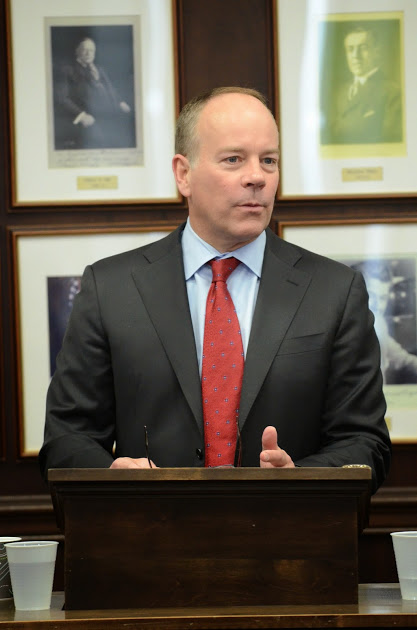Not Federal Stimulus, But Entrepreneurial Creativity
December 24, 2020

Top economic forecaster Brian Wesbury, speaking at Ashbrook’s Major Issues Lecture Series on March 25, assured listeners that the nation’s economy was making steady gains. But he challenged them to think about why it has not rebounded faster since the 2008 economic slump. Today’s economy is not a “racehorse” but a “ploughhourse,” with 2% growth and a steady addition of about 170,000 jobs for the last 47 consecutive months. “It should be 300,000 jobs a month,” he said. Is the slow growth due to inadequate federal stimulus efforts? Just the reverse, he argued. Those efforts have been largely ineffective and counter-productive. Only because “the entrepreneur in America is alive and well” is the economy is growing at all.

Wesbury looks at financial markets with the realism of an economist who began his career in the risk-averse world of banking. But he also brings to his forecasting the optimism of an entrepreneur who sees opportunity around the corner.
He explained the adverse effect of a “mark to market” accounting rule that federal regulators imposed on banks, causing mortgage-backed securities to be undervalued by tying prices to what scared investors, in the wake of the crash, were willing to pay, rather than to what balance sheets showed these funds returned. He explained why the Federal Reserve’s “quantitative easing” program and Troubled Asset Relief Program did not inject much liquidity into the loan market. Because the Fed could at any time withdraw the money it had extended, bankers were unwilling to lend out assets that could suddenly disappear.
Still, the economy grows because American entrepreneurs study “the mosaic of the world,” taking its pieces and rearranging them in a new way. He cited examples: high-pressure “fracking” that finds new sources of natural gas, new cyber technology that stores vastly more information at less cost, and new commercial strategies like that of Netflix, which replaced storefronts with mail delivery.
In their private question and answer session, Ashbrook Scholars pushed Wesbury for a more detailed analysis. A student studying money and banking wondered whether Dodd-Frank regulations had decreased banks’ ability to make loans. Wesbury agreed that the regulations make bankers more risk averse. The government’s approach to strengthening the banking system works at cross purposes, he said: “Here they are on the one hand regulating banks and scaring them half to death, and on the other hand jamming money into the banking system and complaining that banks won’t lend it.”
Another student asked about the entrepreneurial innovations Wesbury cited. What becomes of those who lose jobs when entrepreneurs find cheaper ways of producing and delivering products? Wesbury recounted a parable drawn from Paul Zane Pilzer, author of Unlimited Wealth. A group of ten islanders, each catching from shore enough fish to feed himself each day, see their situation change when two islanders invent a boat and a net and bring in a catch large enough to feed everyone. They can either find new products to trade for the boatmen’s catch, or tax the boatmen, redistributing what they bring in. The latter course does not create a better way of life, Wesbury pointed out.
Wesbury’s own early career experience shows how those who are “down-sized” can rebound. His first job, he told Scholars, involved data-keeping at a Chicago bank; when the bank bought a computer to make the tedious task simpler, he could do in one day what used to take him four. So he used the extra time to study economics, write papers, and build models, educating himself to become the highly successful forecaster he is today.

